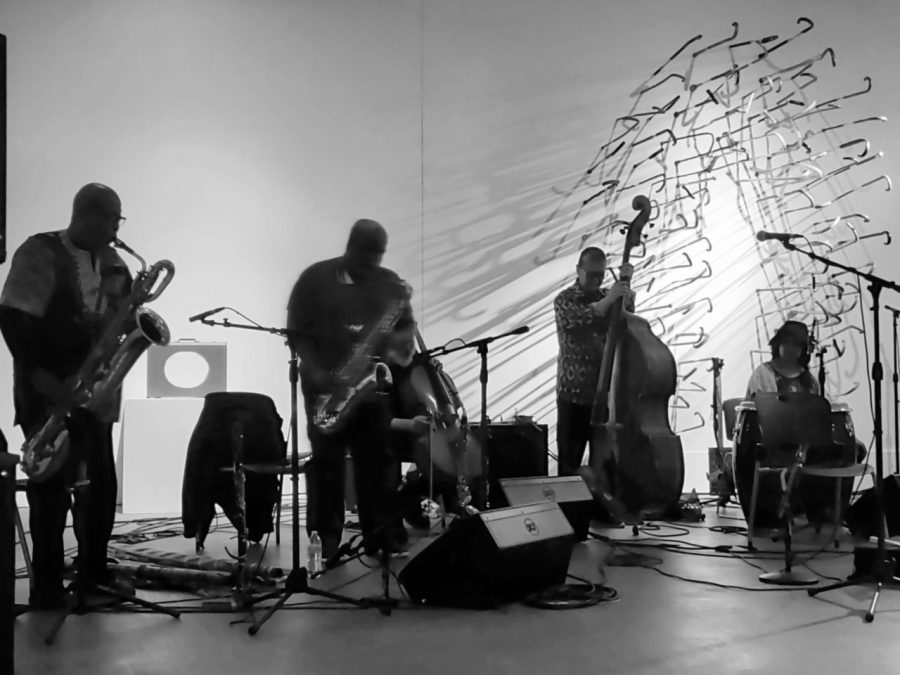MIYUMI Project improvises and innovates
The MIYUMI Project performs in front of Jeremy Chen’s piece titled “A Place for Our Bodies.”
April 14, 2023
The MIYUMI Project, a band fusing jazz and Japanese music, brought an intuitive, improvisational conclusion to Jeremy Chen’s “Device, Tools, Objects and Props” solo exhibition on April 8. The exhibition opened on Jan. 27 of this year in the Grinnell College Museum of Art.
Founded and led by Japanese bassist Tatsu Aoki, the MIYUMI Project is a band that melds traditional Japanese music with Chicago’s experimental jazz tradition. With the band having had over 20 years to hone their craft, Aoki told the audience after the music’s first pause that what they were hearing was “the core essence of Chicago avant-garde jazz music.”
The group’s current roster rotates for each of their performances, so every show does not feature every band member. At this performance, collaborators were Mwata Bowden and Edward Wilkerson Jr., both on the horn and didgeridoo, Jamie Kempkers on the cello, Tatsu Aoki on the upright bass and shamisen, Coco Elysses on the conga drum and Noriko Sugiyama and Kioto Aoki on the taiko drum.
In the dimly lit museum, Tatsu Aoki began the performance by plucking his upright bass. His improvisational collaborators joined in with patience. Some of the music built off of musical structures the band was previously familiar with, giving them the opportunity to improvise around these structures.
One of the reasons why Chen, professor of studio art and chair of the American studies department, said he wanted the MIYUMI Project to close his exhibition is because of his personal interest in improvisation as an artist.
“We try to investigate the potential of something,” he said. “What does this object or space afford?”
Kioto Aoki, drummer and daughter of Tatsu Aoki, said that the band was responding to the room and the audience.
While she said she found the room to be humid — “Very ugly,” she added — which flattened the texture of the taiko’s soundwaves, rehearsal was dedicated to working with the drum to better its sound quality. She also found the audience had brought “good energy” with their engagement.
She referred to a “sixth sense” that the band members have been able to develop through experience in their craft and working together. They are “communicating through the sounds and the energy,” she said.
“There are times when, like, ‘oh, I feel like this is a moment where I can join,’” Kioto Aoki said. “But then the music shifts and maybe that moment has passed, and you’re finding a new way.”
The band was placed in front of “A Place for Our Bodies,” a piece that centers a silhouette of a person on a wall and is surrounded with various canes Chen collected.
Drummer Noriko Sugiyama joined in much later than the rest of the band. When she did join in, she eventually met Kioto Aoki, and they entered into a groove played in near unison, in which the other players stepped back. This sound could be felt throughout the room, and it reverberated to the back, where a brick hung from the ceiling went from stillness to bouncing.
Over the years, musicians in the Chicago area shuffled in and out of the band, including Chen’s brother Jonathan Chen until he moved to New York City. Kioto, who the brothers have known since she was little, added that the group was playing “for Jeremy” and that there was an “awareness” of him.
While introducing the band, Chen tied together the ideas of philosopher Cornel West, on jazz as an American art form, and jazz critic Stanley Crouch, on improvisation.
In referencing West’s idea of jazz bringing together diverse people, Chen said that he loves how the medium feels to be the representation of “this ideal of America.” Though the artist acknowledged the difficulty of reaching this kind of perfection, Chen still spoke to the importance of experimentation.
He also took from a 2006 interview with NPR, in which Stanley Crouch said, “in jazz, the improvisers create things at just about the same velocity that things are usually destroyed. And that, to me, is part of the excitement and the wonder of the art.”
With the destruction brought by wars, shifting weather patterns and the global pandemic, Chen added, “Of all of these things, I just feel like we need things like this that are what bring us together to create something.”














































